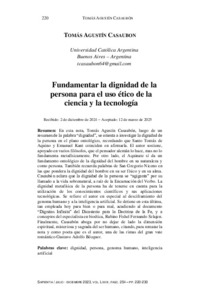Por favor, use este identificador para citar o enlazar este ítem:
https://repositorio.uca.edu.ar/handle/123456789/19822| Título: | Fundamentar la dignidad de la persona para el uso ético de la ciencia y la tecnología | Autor: | Casaubón, Tomás Agustín | Palabras clave: | DIGNIDAD; PERSONA; GENOMA HUMANO; INTELIGENCIA ARTIFICIAL | Fecha de publicación: | 2023 | Editorial: | Pontificia Universidad Católica Argentina. Facultad Filosofía y Letras | Resumen: | En esta nota, Tomás Agustín Casaubón, luego de un resumen de la palabra “dignidad”, se orienta a investigar la dignidad de la persona en el plano ontológico, recordando que Santo Tomás de Aquino y Emanuel Kant coinciden en afirmarla. El autor sostiene, apoyado en varios filósofos, que el pensador alemán lo hace, mas no lo fundamenta metafísicamente. Por otro lado, el Aquinate sí da un fundamento ontológico de la dignidad del hombre en su naturaleza y como persona. También recuerda palabras de San Gregorio Niceno en las que pondera la dignidad del hombre en su ser físico y en su alma. Casaubón aclara que la dignidad de la persona se “agiganta” por su llamado a la vida sobrenatural, a raíz de la Encarnación del Verbo. La dignidad metafísica de la persona ha de tenerse en cuenta para la utilización de los conocimientos científicos y sus aplicaciones tecnológicas. Se refiere el autor en especial al desciframiento del genoma humano y a la inteligencia artificial. Se detiene en esta última, tan empleada hoy para bien o para mal, acudiendo al documento “Dignitas Infinita” del Dicasterio para la Doctrina de la Fe, y a conceptos del especialista en bioética, Rabino Fishel Fernando Szlajen.Finalmente, Casaubón aboga por no dejar de lado la dimensión espiritual, misteriosa y sagrada del ser humano, citando, para rematar la nota y como poeta que es el autor, una de las rimas del gran vate romántico Gustavo Adolfo Bécquer. In this note, Tomás Agustín Casaubon, after a summary of the origin of the word "dignity," aims to investigate the dignity of the person on the ontological level, recalling the agreement in its affirmation between Saint Thomas Aquinas and Emanuel Kant. With the support of several philosophers, the author asserts that the German thinker upholds this affirmation without substantiating it metaphysically. On the other hand, Aquinas does provide a metaphysical foundation for human dignity, both in human nature and as a person. He also recalls words from Saint Gregory of Nyssa, in which he reflects on human dignity in both the physical body and the soul. Casaubon clarifies that the dignity of the person is "magnified" by his call to supernatural life, due to the Incarnation of the Word. The metaphysical dignity of the person must be considered for the use of scientific knowledge and its technological applications. The author specifically refers to the deciphering of the human genome and artificial intelligence. He focuses on the latter, so widely used today (for better or worse) to make a call to prudence and refers to the document "Dignitas infinita", from the Dicastery for the Doctrine of the Faith, and concepts from the bioethics specialist, Rabbi Fishel Fernando Szlajen. Finally, Casaubon advocates not neglecting the spiritual, mysterious, and sacred dimension of the human being, citing, as a poet that he is, one of the rhymes of the great romantic bard Gustavo Adolfo Bécquer. |
URI: | https://repositorio.uca.edu.ar/handle/123456789/19822 | ISSN: | 0036-4703 | Derechos: | Atribución-NoComercial-CompartirIgual 4.0 Internacional | Fuente: | Sapientia. 2023, 79(254) |
| Aparece en las colecciones: | SAP - 2023 Vol LXXIX nro. 254 |
Ficheros en este ítem:
| Fichero | Descripción | Tamaño | Formato | |
|---|---|---|---|---|
| fundamentar-dignidad-persona.pdf | 230,66 kB | Adobe PDF |  Visualizar/Abrir |
Este ítem está sujeto a una Licencia Creative Commons

